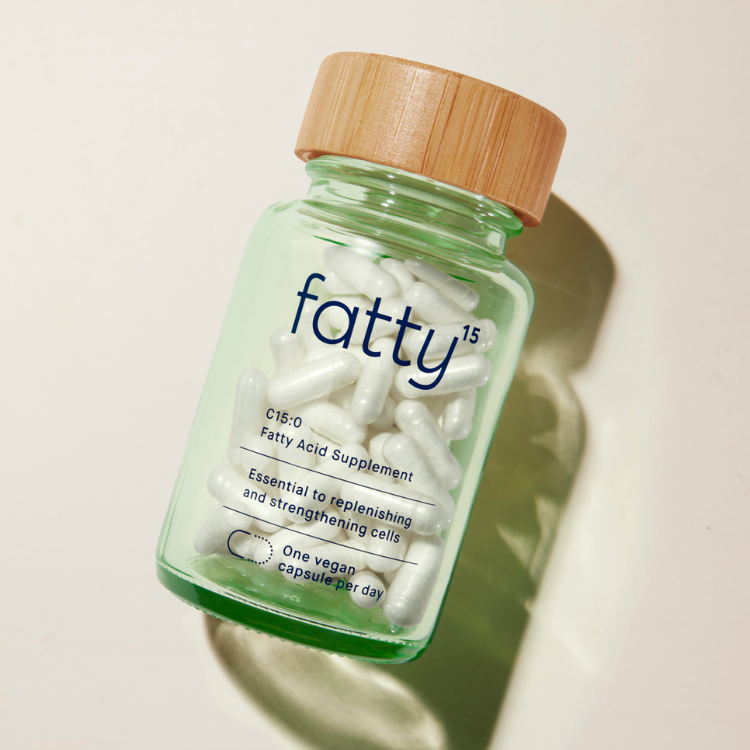In the era of wellness influencers handing us a million and one pieces of nutrition, diet, and fitness advice every time we’re scrolling on socials, finding out that there is yet another nutrient to think about throwing into the mix can be bit jarring. It always feels like right when we get into a routine that works for us, there’s a new wellness trend we just have to try that’s gonna change our lives. So don’t worry: We’re not we’re telling you to change your entire meal plan or even your daily routine. You probably already eat a lot of the foods that have this nutrient, and if you don’t, it’s as simple as popping one supplement a day (hello fatty15).
You’ve most likely heard the term “fatty acid” before, right? Maybe way back when in your high school biology class, or maybe you’re hearing it now because it’s having its moment in the media with benefits that sound too good to be true: protects the liver, boosts immunity, improves your rest, calms your mood, and even enhances longevity. But what exactly is this do-it-all nutrient, and why are we talking about it now? The TLDR of it all is that fatty acids are actually an essential part of taking care of our overall nutrition and well-being. Although it might sound like a complex topic reserved for our STEM gals out there, they’re just as important as some hot topics we hear much more about like carbs and protein. From heart health and brain function to glowing skin and strong hair, this essential nutrient is truly the unsung hero of our diet that, in our humble opinion, deserves all of the hype.
With the help of celebrity nutritionist Keri Glassman, we’ve broken down everything you need to know about fatty acids, including what they are, why they’re important, the best food sources, and how to make sure your body is getting exactly what it needs. Whether you’re looking to improve your diet, boost your health, or simply understand more about the fats in your food, we’ve got you covered:
Meet the Expert
Keri Glassman, MS, RD, CDN
Keri Glassman is a renowned celebrity nutritionist, healthy cooking expert, and wellness thought-leader. She is the founder and CEO of Nutritious Life and The Nutritious Life Studio, an online certification that provides unparalleled, forward-thinking education to individuals of various backgrounds looking to establish successful careers in the health and wellness industry.
What are fatty acids?
Fatty acids are the primary components of fats, serving as the building blocks that construct the fat molecules in our bodies. They are vital for numerous bodily functions, including the formation of cell membranes and hormones. Fatty acids come in two main categories: essential and non-essential. Essential fatty acids, such as omega-3s and omega-6s, cannot be synthesized by the body and must be obtained through diet or supplements. In contrast, non-essential fatty acids are produced by the body from amino acids. Here’s a more specific breakdown of each type of fatty acid and what they do:
Omega-3s
Omega-3s are a special type of polyunsaturated fat (PUFAs) that we cannot produce on our own, so we must obtain them through diet or supplements. These are crucial for making cell membranes and hormones and regulating genetic expression, and they’ve been linked to reducing inflammation, boosting heart health, decreasing the risk of depression, and sharpening cognition and memory. There are two different types of omega-3s, with their main difference being what types of foods they can be found in:
- Alpha-Linolenic Acid (ALA): Found in plant sources such as chia seeds, flaxseeds, and walnuts. ALA reduces the risk of stroke and promotes heart health. However, it needs to be converted to EPA and DHA to be used by the body, and this conversion process is inefficient.
- Eicosapentaenoic Acid (EPA) and Docosahexaenoic Acid (DHA): Found in fatty fish like salmon, mackerel, and sardines. EPA and DHA are directly used by the body and are known for their significant anti-inflammatory properties, as well as their benefits for heart health, mental well-being, and cognitive function.
Omega-6s
Omega-6s are another essential type, commonly found in what we might refer to as the “typical American diet” through vegetable oils like sunflower, safflower, and corn oil. These fatty acids are important for cell membrane function and hormone production. However, it’s crucial to balance omega-6 intake with omega-3s to avoid excessive inflammation, as the American diet typically has an abundance of omega-6s.
C15:0 (Pentadecanoic Acid)
C15:0 is a newly recognized essential fatty acid found in full-fat dairy products and some types of fish and meat. C15:0 integrates into cell membranes, serving as an armor to keep cells healthy and protected, and it has been shown to balance immunity, aid in heart health, improve metabolism, and support red blood cell and liver health. This fatty acid protects cells against premature breakdown and is considered the first essential fatty acid discovered in 90 years, highlighting its emerging importance in an ideally balanced diet. C15:0 can be found in some types of fish, meat and plants in very low levels, although our primary source of C15:0 is whole fat dairy products. And if you want to make sure you’re getting enough C15:0 to reap its benefits, fatty15 provides a pure C15:0 ingredient in the form of one pill a day.
Why are fatty acids important?
Fatty acids are essential for maintaining various bodily functions and promoting overall health, as they are integral in building and maintaining cell membranes, producing hormones, and regulating genetic expression. Here are some key benefits you can notice in your day-to-day life once you start incorporating the right amount for you in your everyday diet:
- Heart health: Omega-3 fatty acids have been shown to reduce inflammation, lower triglycerides, and decrease the risk of heart disease.
- Brain function: These fats are crucial for cognitive function, enhancing memory, and reducing the risk of depression.
- Skin, hair, and nails: Fatty acids keep your skin hydrated, promote healthy hair growth, and strengthen nails.
- Inflammation and immunity: They help regulate the body’s inflammatory response and support the immune system.
- Metabolism and aging: Fatty acids contribute to a healthy metabolism and can help protect against age-related cellular damage.
What foods are rich in fatty acids?
Incorporating foods rich in fatty acids into your diet is essential for reaping their health benefits. Different foods contain different types of fatty acids—here are some top sources for each:
Omega-3s
- Fatty fish (salmon, mackerel, sardines)
- Chia seeds
- Flaxseeds
- Walnuts
- Algal oil (a plant-based source of DHA)
Omega-6s
- Vegetable oils (sunflower, safflower, corn oil)
- Nuts and seeds
C15:0
- Full-fat dairy products (whole milk, butter, whole milk yogurt, cheese, etc.)
- Certain types of meat and fish (beef, salmon, lamb, etc.)
Cooking methods can impact the availability of these fatty acids. Omega-3s, for instance, aren’t particularly heat-sensitive but can be degraded by high-temperature cooking.
How do I know if I am getting enough fatty acids in my diet?
Even with a healthy diet, it can be hard to obtain sufficient amounts of certain fatty acids, particularly omega-3s and C15:0. If you’re aiming to improve heart health, reduce inflammation, or boost your immune system, taking a supplement might be the move for you. Of course, consider speaking with a healthcare provider to determine if taking supplements is right for you, especially if you have dietary restrictions or specific health concerns. If you do get the green light to incorporate a supplement into your daily routine, we highly recommend checking out fatty15.
Fatty15 is a super convenient supplement that provides a pure, vegan source of C15:0. As we mentioned above, C15:0, is a newly recognized essential fatty acid that supports cell membrane integrity, balances immunity, and promotes overall metabolic health. Fatty15 also offers several additional benefits, making it a comprehensive supplement for your overall wellness. It protects our cells against age-related breakdown, repairs mitochondrial function to provide more energy for cells and ourselves, and improves metabolism. It also supports immune function, enhances mood, and contributes to better sleep quality. Basically, a huge win all around.
Fatty15 is designed to be a super easy addition to your daily routine, offering significant health benefits with just one small capsule a day. Unlike some supplements that require multiple doses or complex regimens, it simplifies the supplementation process while still delivering substantial results. We love a painfully simple way to improve our health, and that’s exactly what fatty15 is. By incorporating fatty15 into your daily regimen, you can experience a wide range of health benefits that contribute to overall well-being and vitality.

fatty15
Our editors love how easy this supplement integrates into their daily routines and, even more so, rave about the benefits. With short-term effects like improved energy and sleep paired with the long-term benefits like healthier hair and improved heart health, this is a one-stop-shop to becoming your most well self.
What are some common misconceptions about fatty acids?
There are several myths about fatty acids that need debunking:
- Fat makes you gain weight: Contrary to popular belief, consuming healthy fats doesn’t make you gain weight. In fact, fats are essential for satiety and can aid in weight management.
- All saturated fats are bad: Not all saturated fats are harmful. For example, C15:0 has been shown to offer various health benefits—everything in moderation!
- You don’t need fats if you’re cutting calories: Fats are crucial for overall health, and eliminating them can lead to deficiencies and health issues.
All in all, understanding the role of fatty acids in your diet is fundamental to maintaining a balanced and healthy lifestyle. By including a variety of fatty acid-rich foods and considering supplements when necessary, you can support your heart, brain, and overall well-being to help you feel your very best in your day-to-day life. In 2024, we’re embracing fats as our new best friends.

This post is sponsored by fatty15, but all of the opinions within are those of The Everygirl editorial board.
Source: Cosmo Politian











